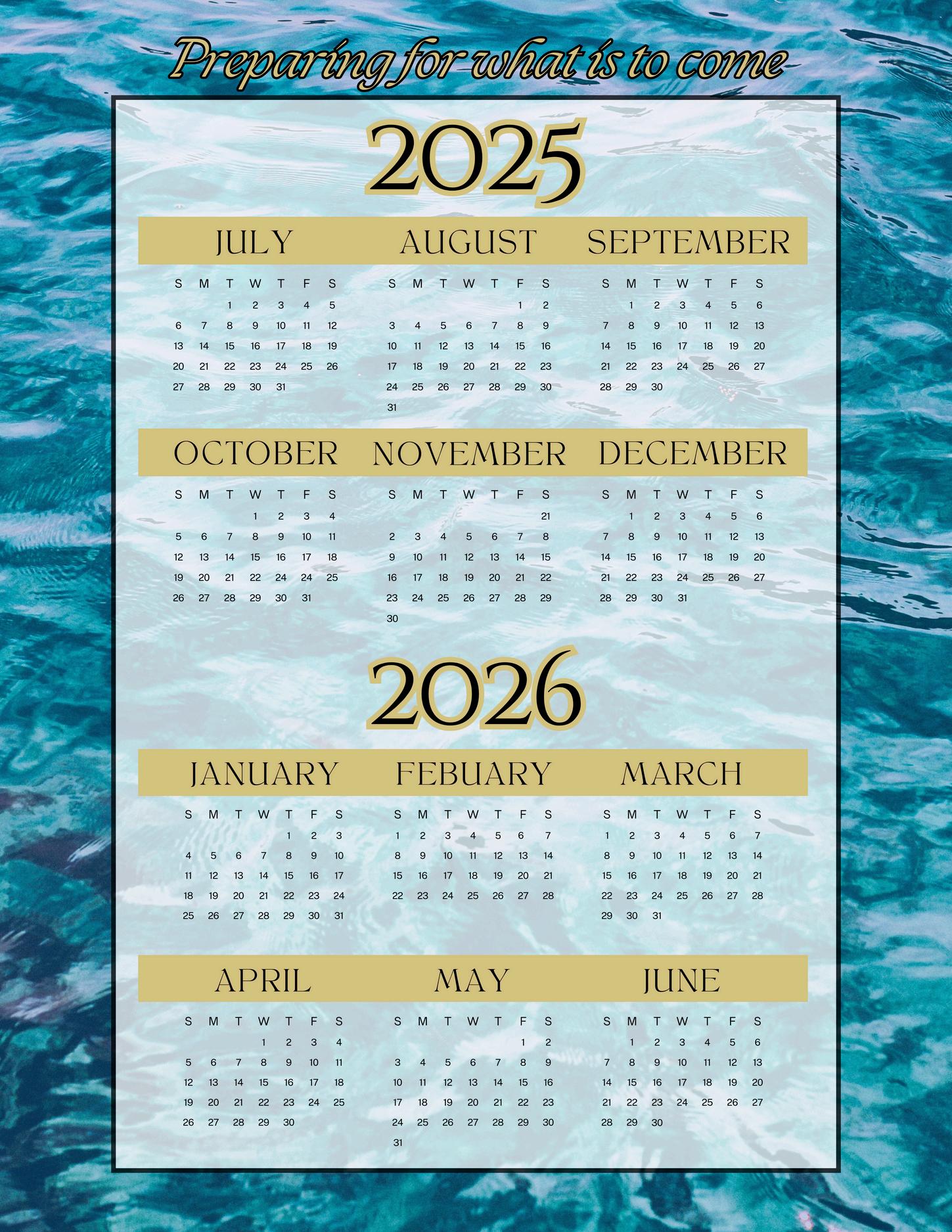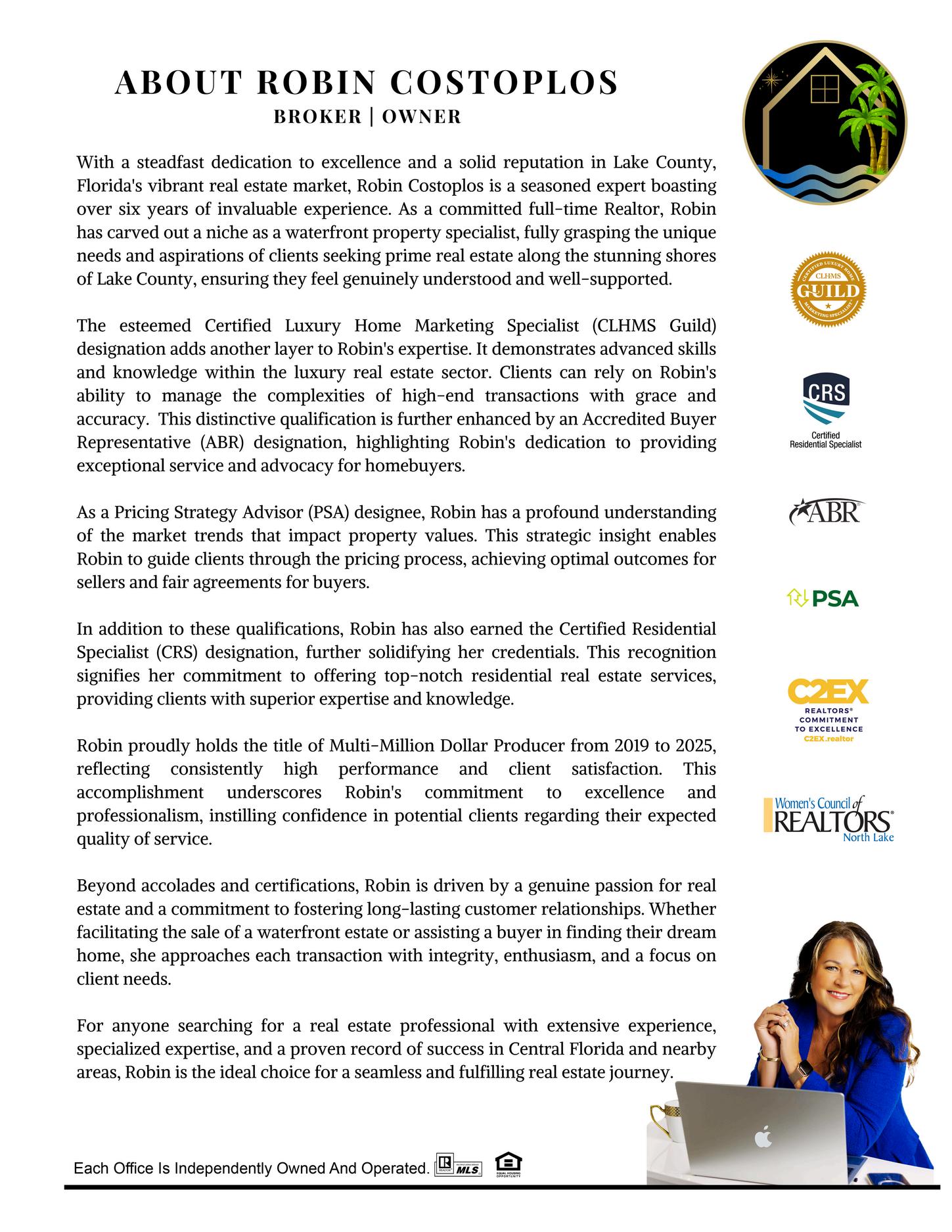















Conduct counseling and information sessions to identify your needs and goals and help you execute an accurate property search.
Offer to arrange a meeting with a lender to determine an accurate, affordable price range.
Commit to Priority availability for meeting your needs and schedule for property showings and research.
Offer access to community and property information
Provide data on recently sold properties within the area of your home selection, if requested.
Prepare a written Offer to Purchase on the property of your choice, reflecting your price and terms.
Present all purchase offers promptly using standardized forms.
Assist in accessing information on licensed building inspectors before the Offer to Purchase.
Assist you in monitoring the status of satisfaction of contract contingencies.
Accompany you on walk-through property inspections before closing, if provided for in the contract.
Contact you after closing to ensure satisfactory completion of all service details.

Congratulations! You've decided to start fresh and purchase a new home. This is a very exciting time for you and we look forward to guiding you smoothly through this process, helping you to efficiently find the home of your dreams. As you will see, there are several steps you need to take before you move into your new home. When using a Lake Property Stars Realtor®, you will feel confident your search for a new home will be very successful. Let’s get started!
1. You’ll have an expert to guide you through the process
Buying or selling a home usually requires disclosure forms, inspection reports, mortgage documents, insurance policies, deeds, and multi-page settlement statements
2. Get objective information and opinions. Realtors® can provide local community information on utilities, zoning, schools, and more. They’ll also be able to provide objective information about each property


3. Find the best property out there.
Sometimes, the property you seek is available but not actively advertised in the market, and your Realtor® will need to investigate to find all available properties
4. Benefit from our negotiating experience. Many negotiating factors exist, including, but not limited to, price, financing, terms, date of possession, and the inclusion or exclusion of repairs, furnishings, or equipment
5. Property marketing power.
Real estate doesn’t sell by marketing alone. In fact, many real estate sales are the result of a practitioner’s contacts through previous clients, referrals, friends, and family
6. Real estate has its own language.
If you don’t know a CMA from a PUD, you can understand why it is essential to work with a professional who is immersed in the industry and knows the real estate language
7. Buying and selling is emotional.
A home often symbolizes family, rest, and security not just four walls and a roof Having a concerned but objective third party helps you focus on the emotional and financial issues that matter most to you.
8. Ethical treatment.
As a Realtor® customer, you can expect honest and ethical treatment in all transaction-related matters Realtors® must take the Code of Ethics orientation and they are alsos required to complete a refresher course every two years


Familiarize yourself with the Mortgage Process
Get Pre-Qualified & Pre-Approved
Get finances in order and prepare your budget
Identify your needs and wants


Make an offer & negotiate a price.
Arrange for Home Inspections
Confirm Closing Date
Conduct a Final Walkthrough
Find a home that meets your criteria
How long is the mortgage application process?
An application usually takes 30 to 60 days to process, although some transactions can take as few as seven or as long as 90 days The actual time depends on how quickly the lender can obtain a credit report, verify employment and bank accounts, and an appraisal of the property.
What documents will I need to provide?
Be prepared to verify income (including a paystub and recent tax returns), bank account numbers, and details about your long-term debt (credit cards, auto loans, child support, etc.). If you’re self-employed, you may also be required to provide financial statements for your business. In recent years, lenders have been required to obtain more specific information for borrowers to package and sell loans to investors.
What could delay the approval of my loan?
Everything should go smoothly if you provide the lender with complete, accurate information However, you may need a delay if the lender discovers credit problems or your personal or financial status changes between submitting an application and closing There may also be delays associated with the appraisal
Close and Settle Deal
What is included in my house payment?
Principal and interest on your loan. Depending on the terms of your loan, the payment may also include hazard (homeowners) insurance, mortgage insurance, and property taxes.
Can I pay for those things separately?
Not if it’s an FHA or VA-insured loan. With most other loans, you can pay your taxes and insurance if you borrowed no more than 80% of your home's purchase price or appraised value Check with your lender to be sure
What does the closing costs include?
Closing costs cover the processing and administration of your loan In addition to a loan fee, you’ll usually be asked to prepay interest charges to cover the partial month you close, and you may be required to deposit monies into an escrow account for property taxes, hazard insurance, and mortgage insurance These are called “Reserves”
When do my mortgage payments start?
It usually takes 45 to 60 days after closing. Your closing documents will include the actual date of yo nt





APPLY FOR A MORTGAGE/PAPERWORK/LOAN APPLICATION
LENDER BEGINS PROCESSING APPLICATION
LENDER PROVIDES BOOKLET OF ESTIMATED CLOSING AND RELATED COSTS
ESTIMATE OF YOUR LOAN COST IN THE FORM OF INITIAL TRUTH IN THE LENDING DISCLOSURE STATEMENT OF LOAN ESTIMATE
LENDER EVALUATES THE APPLICATION AND PRE-APPROVES THE LOAN
SEARCH BEGINS - REALTOR® SHOWS YOU MULTIPLE LISTINGS
YOU FIND THE HOUSE YOU WANT AND MAKE AN OFFER
THE LENDER PROCESSES THE LOAN AND ISSUES FINAL APPROVAL
SIGN CLOSING DOCUMENTS, AND THE LOAN IS FUNDED
APPROPRIATE DOCUMENTS RECORDED AT COUNTY RECORDER’S OFFICE
THE HOME IS YOURS!
Before searching for a new home, you must determine your budget and estimate how much you can afford Getting pre-approved for a mortgage is one of the most critical factors in figuring out your financial budget. A mortgage is an advance of money from your lender that will cover the finances of your new property. The mortgagee (you) must make monthly payments to repay the debt The monthly payment consists of principal and interest and is repaid over 15, 20, 30, or 40 years. This is how most homes are purchased.


Unless you’re a cash buyer, homes and financing are closely intertwined (Financing is the difference between the purchase price and the down payment, commonly called the mortgage.) Of course, a bank will only lend you money if they’re confident you can pay them back. A bank checks your credit by studying your financial history, income, federal tax returns, pay stubs, auto loans, child support, etc ) to determine if you are a good candidate for a loan
Pre-approval and pre-qualification are stages in the mortgage application process, but they require different levels of commitment and reliability Pre-qualification involves a basic assessment of a borrower's financial situation, relying on information provided by the individual. While it gives a general idea of how much one might be able to borrow, it needs to have the thorough analysis and verification that pre-approval entails
A lender comprehensively examines a borrower's financial history, credit score, and other pertinent details before issuing a written commitment indicating a specific loan amount for which the borrower is approved. In a competitive housing market, pre-approval is considered more reliable and attractive to sellers because it demonstrates a higher level of seriousness and financial readiness for the buyer Ultimately, pre-approval offers a clearer picture of the borrower's eligibility

Company: Contact name:
Phone Number:
Fax Number:
Email:
Pre-Approval Amount:
Pre-Approval Valid until:
Quoted Interest Rate:
Notes & Reminders:


Do House Hunt with a Realtor
Do Get pre-Approved for a mortgage
Do Keep your spending in check. Stay current and make payments on time.
Do Keep good records of all your transactions for your loan
Do Stay with your current employer. Job history is important
Don’t just get pre-qualified for a mortgage
Don’t Max out your credit cards, close accounts,consolidate debt, or pay off collections without talking to your Lender first!
Don’t place untraceable funds into your bank account
Don’t make any large purchases over the next few months or apply for any new debt until after closing!

Use this section to keep track of the houses you want to see and fill in the details about the houses you have already seen with your Realtor®. Take notes, or just plain cross out the “OH NO THANK YOU” houses.


One of the many advantages of working with an agent is our access to multiple listings. That means you can see every house on the market if you’d like to. We can provide a detailed description of any property of interest, including special features. Plus, we screen all the listings before we show them to save you time and eliminate the homes that don’t meet your criteria. Open houses are a great way to get a feel of a specific property. You can be sure that I will inform you of upcoming open houses, giving you vital information and details of the property. If you require special features such as a swimming pool, wheelchair access, or even skylights, we will show you only those properties that accommodate your needs.

What does your future home look like? Where is it located? As you hunt down your dream home, consult this list to evaluate properties and keep your priorities in mind.
What neighborhoods do you prefer?
How close must the home be to these amenities:
Public Transportation
Airport Expressway Neighborhood shopping Schools
What architectural style(s) do you prefer?

Do you want to buy a house, condominium, or townhome?
Would you like a one or two-story home?
How many bedrooms & bathrooms?
Do you prefer new construction?
If you’re looking for an existing one, how old of a home would you consider?
How much repair or renovation are you willing to do?
Do you have special needs that your home must meet?

Did you see this In Person? YES NO
Address: Price:
Address:
Date of Showing:
SQ FT:
Bedrooms #:
Bathrooms #:
Did you see this In-Person? YES NO
Address:
Date of Showing:
SQ FT:
Bedrooms #:
Did you see this In-Person? YES NO

Did you see this In Person? YES NO
Address: Price:
Address:
Date of Showing:
SQ FT:
Bedrooms #:
Bathrooms #:
Did you see this In-Person? YES NO
Address:
Date of Showing:
SQ FT:
Bedrooms #:
Did you see this In-Person? YES NO

Did you see this In Person? YES NO
Address: Price:
Address:
Date of Showing:
SQ FT:
Bedrooms #:
Bathrooms #:
Did you see this In-Person? YES NO
Address:
Date of Showing:
SQ FT:
Bedrooms #:
Did you see this In-Person? YES NO

Did you see this In Person? YES NO
Address: Price:
Address:
Date of Showing:
SQ FT:
Bedrooms #:
Bathrooms #:
Did you see this In-Person? YES NO
Address:
Date of Showing:
SQ FT:
Bedrooms #:
Did you see this In-Person? YES NO

What is a fair price to offer based on condition, market and funds?
What are the most important terms to you? Closing Date, Inspection Period, Repairs, Money?
What is important to the Seller? It’s not always price...
Not every offer is a good offer if you try to offer too low you risk the seller not wanting to negotiate with you at all.
Once you have discussed market and property conditions, it is time to write the formal offer. In Florida, we use two different types of contracts. The As-Is FarBar contract is most often used in our area. There is also the Standard FarBar contract, with only a few differences, mainly concerning repairs after inspection.
Once the offer has been written, I will submit it to the listing agent. Before I submit the offer, I always call them to let them know it will be coming so they can expect it, along with a summary of the terms and conditions.
When an offer is submitted, the seller has a specific period to accept, reject, or counteroffer (typically 24-48 hrs). This deadline is in the written offer. If the seller accepts your offer, you will be considered under contract or pending. If they reject your offer, you can always submit another offer. You have 24 hours to accept, reject, or counteroffer back if they counteroffer. Whenever there is a counteroffer, the deadline is extended by 24 hrs. Once your offer is accepted, the inspection period begins, and so does the timeline for loan approval.
The lender will order an appraisal and possibly a survey, and your loan needs to be processed. The underwriter will then determine whether you qualify and the home qualifies for the mortgage. This typically takes 30-45 days. This is why you have only a few days after signing the contract to obtain the documents required for loan approval from the lender.

Preferred Closing Date:
Offered Price
# of Inspection Days
Amount of Escrow Deposit
#of Days to Deposit Escrow
Title Company
# days to get Title Commitment

Make your escrow deposit.
You usually have three days (double-check the contract) to deposit your escrow with the Title company or Closing Attorney. You can do this by checking or wire transfer; cash is not an option.
Let your lender know you are under contract. They will ask for a copy of the agreement, which our transaction assistant or I will provide. They may also ask for any additional documentation needed to underwrite the mortgage.
Transaction coordinator.
Our transaction coordinator will send you an email introducing themself and give you a list of timelines and things to expect.
If you ever have a question, review your contract as it spells out all timelines and deadlines, or ask us or our transaction coordinator.
Title Company will reach out.
The title representative will contact you to introduce their company and request some documents. The company and contact information will be on the contract, which is where you made your deposit of escrow funds.
Now, we are on the clock and have an inspection period (unless waived) to ensure the home is in the condition you expected. Typically, inspection periods last from 0 to 15 days. I've written this timeline in your offer and executed the contract.

Recommended Inspections:
Complete Home Inspection (checks almost everything)
4 point Inspection (Roof - HVAC - Electrical - Plumbing)
Wind mitigation (in Florida this can help lower insurance)
WDO (wood destroying organisms) aka termite inspection
Pool & Pool Equipment Inspection
When inspections are completed, your inspector will send you a report detailing any deficiencies. From here, we would like to discuss what safety issues need to be repaired simply because insurance could be an issue, or it would be unsafe not to have it repaired before closing.
During the inspection period with the As-Is contract, the buyer can back out of the contract or renegotiate with the seller, giving a concession for the buyer to make the needed repairs after the sale if the seller is not willing to make repairs and get their escrow (good faith deposit) returned by signing a release and cancellation addendum. Also, the seller can avoid making repairs with this type of contract, where the standard Far Bar contract differs. With the standard Far-Bar contract, the seller has agreed to make repairs up to a specific dollar amount in the written offer usually, 1-3% of the purchase price.
Once the inspections have been agreed upon and the inspection period is up, it becomes waiting time. You can use this time to find homeowners insurance, follow up with the lender, and get them any needed documents.


Bring the list of Repairs that were expected to be done and check to make sure they were completed.
Make sure the home has been “broom swept” this doesn’t mean immaculate.
The final walk-through is a crucial step in home-buying, allowing buyers to inspect the property one last time before closing the deal. During this walkthrough, buyers should pay close attention to the home's overall condition and ensure that any previously agreed-upon repairs have been completed satisfactorily. Ensure all appliances, systems, and fixtures, including plumbing, electrical, and HVAC, are in working order. Examine the walls, floors, and ceilings for any signs of damage that may have occurred since the last visit. Verify that all included items, such as kitchen appliances or window treatments, are present and in the promised condition. It's also advisable to test light switches, outlets, and faucets. Additionally, buyers should confirm that the sellers have vacated the property and that there are no surprises. This final walk-through is the last chance for buyers to address any concerns before closing, so a thorough inspection is crucial to ensure a smooth transition into homeownership.



Title Insurance is crucial for new home buyers as it safeguards against potential legal and financial challenges related to the property's title. When purchasing a home, buyers expect clear and undisputed property ownership. However, unforeseen issues such as undisclosed liens, unresolved legal disputes, or errors in public records can threaten this expectation. Title insurance offers protection by thoroughly examining the property's title history, identifying any potential defects, and addressing them before the transaction is completed. This proactive approach prevents financial losses and ensures peace of mind for the home buyer, allowing them to confidently invest in their new property without fearing future legal complications. In essence, title insurance is a vital risk mitigation tool, offering an added layer of security and assurance in one of the most significant financial transactions a person can undertake purchasing a home.





Adjustable Rate Mortgage (ARM): A mortgage that provides for periodic changes in the interest rate based on changing market conditions.
Amortize: To liquidate or extinguish (a mortgage, debt, or other obligation), especially by periodic payments to the creditor or a sinking fund, to write off a cost of (an Asset) gradually.
Annual Percentage Rate (APR): Annual percentage rate: the annual rate of interest, the total interest to be paid in a year divided by the balance due.
Appraisal: Estimating or judging the nature or value of something or someone. Valuation is an estimate of value for sale, assessment, or taxation; valuation.
Buyer’s Broker Agreement (BBA): is a contract where a buyer hires a real estate broker to represent their interests in finding and purchasing a property. The agreement outlines the broker’s services, compensation, and the duration of the representation, typically granting exclusive rights to the broker during the specified term.
Closing: The final step in property purchase is transferring the title from the seller to the buyer. At closing, the seller receives payment for the property. Also known as settlement.
Closing Costs: A Closing Disclosure is a five-page form that provides final details about your selected mortgage loan. It will be sent before closing, and 72 business houses must sign the initial document before closing. It includes the loan terms, your projected monthly payments, how much you will pay in fees, and other costs to get your mortgage (closing costs).
Contingency: A clause in a purchase contract outlining conditions to be fulfilled before the contract is executed. Both buyer and/or seller may include contingencies in a contract, but both parties must accept the contingency.

Conventional Loan: A private sector loan is not guaranteed or insured by the U.S. Government.
Deed: A writing or document executed under seal and delivered to effect a conveyance, genuine estate.
Disclosures: The release of relevant information about. Property that may influence the final sale, mainly if it represents defects or problems. “Full disclosure” usually refers to the seller's responsibility to provide all known information about the property voluntarily. A seller found to have knowingly lied about a defect may face legal penalties.
Earnest Money: Money given by a buyer to a seller to bind a contract.
Easement: A right held by one property owner to make use of the land of another for a limited purpose, as the right of passage
Escrow: A contract, deed, bond, or other written agreement deposited with a third party by whom it is to be delivered to the grantee or promisee on the fulfillment of some condition.
Fannie Mae (FNMA): A federally-chartered enterprise owned by private stockholders that purchase residential mortgages and convert them into securities for sale to investors; by purchasing mortgages, Fannie Mae supplies funds that lenders may loan to potential home buyers.
Federal Housing Administration (FHA): This agency provides mortgage insurance on loans made by FHA-approved lenders throughout the United States and its territories. It insures mortgages on single-family and multifamily homes, including manufactured homes and hospitals.
Fixed-Rate Mortgage: A home mortgage for which equal monthly payments of interest and principal are paid over the life of the loan, usually for 30 years.

Freddie Mac: Federal Home Loan Mortgage Corporation (FHLM), a federally chartered corporation that purchases residential mortgages, secures them, and sells them to investors; this provides lenders with funds for new home buyers.
Lein: The legal claim of one person upon the property of another to secure the payment of a debt or the satisfaction of an obligation.
Origination Fee: A fee charged by a lender for evaluating and processing a loan application, usually a percentage of the face value of the loan.
PITI: Principal, Interest, Taxes, and Insurance
Promissory Note: A written promise to pay a specified sum of money to a designated person, their order, or the bearer of the note at a fixed time or on demand.
Rate Lock: A commitment by the lender to a borrower guaranteeing a specific interest rate over some time at a set cost.
Showing Agreement: is a document that allows a real estate agent to show a property to a potential buyer without committing the buyer to a long-term exclusive representation agreement. It essentially formalizes the relationship for a specific showing or a limited number of showings. This agreement is particularly useful for buyers who want to explore properties with different agents
Title: In property law, a title is a bundle of rights in a piece of property in which a party may own either a legal or equitable interest. The rights in the bundle may be separated and held by different parties. It may also refer to a formal document, such as a deed, that serves as evidence of ownership.
Underwriting: This involves analyzing a loan application to determine the risk involved in making the loan. It includes reviewing the potential borrower’s credit history and judging the property value.

Do you know which county you would like to live in?

There are 67 Counties in Florida




